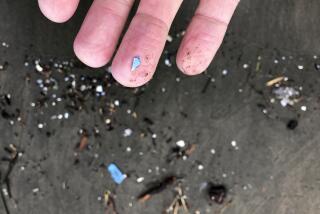Study Warns of Sidestream Smoke Perils : Cigarettes: Scientist says young roosters face an increased risk of heart disease after inhaling secondhand tobacco smoke. Results suggest that children could be similarly affected, he says.
- Share via
NEW YORK — Tobacco smoke may promote early stages of heart disease in children who chronically breathe it from other people’s cigarettes, suggests a study that found such an effect in young roosters.
Before the roosters were 6 months old, their arteries showed abnormalities called plaques of a size normally not seen until the second year of life, said researcher Arthur Penn.
The plaques are an early stage of atherosclerosis, a disease that can set the stage for heart attacks.
Penn said that it is not clear yet whether the animal results show what happens in people, and that there is no direct evidence for the effect in humans. But since atherosclerosis begins at early ages in people, the new results suggest that secondhand smoke may speed up the process in children, he said.
The American Heart Assn. in 1992 declared secondhand smoke a major preventable cause of heart disease. The new study was exploring biological reasons for the link.
Prior animal studies have shown a similar effect in response to high concentrations of smoke, sometimes combined with high-cholesterol diets. But the roosters in the new study were fed low-cholesterol diets and breathed smoke levels resembling those found in bars, Penn said.
“We did everything to minimize the possible development of plaques except give the animals sidestream (secondhand) smoke,” he said.
He also said it is not clear what component of tobacco smoke might be responsible.
Penn is a research professor of environmental medicine at the Nelson Institute of Environmental Medicine in Tuxedo, N.Y., part of the New York University Medical School. He did the work with Carroll Snyder and Lung Chi Chen of the institute.
Penn reported the work recently at the annual meeting of the Federation of American Societies of Experimental Biology.
Stanton Glantz of UC San Francisco, who had done similar work with rabbits, said the new work is important because it shows an effect despite a low dose of smoke and a low-cholesterol diet.
In the study, 30 roosters were exposed to cigarette smoke for six hours a day, five days a week, between the ages of 6 weeks and 22 weeks. Those ages are considered young for the animals, which normally live about 12 years, and the exposure relatively brief, less than 1% of life span.
Ten other roosters breathed regular air. Later, laboratory examination showed plaques from the smoke-exposed roosters were, on average, 50% bigger, suggesting they developed faster in response to the smoke, Penn said.





